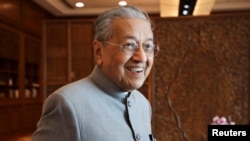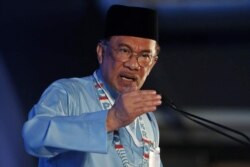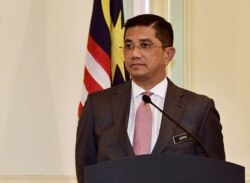Malaysia's government looks increasingly likely to miss a promised mid-2020 leadership transfer from Prime Minister Mahathir Mohamad to coalition partner Anwar Ibrahim, raising fears of a succession scuffle that could split an already fragile alliance and cost it the next election.
The former mentor and protégé fell out in the late 1990s but joined forces again to hand the country's long-ruling and corruption-mired Barisan Nasional coalition a surprise national election defeat in May 2018 by promising to clean up government, lower living costs and bolster minority rights. Heading into the polls, Mahathir, now the world's oldest serving prime minister at 94, also vowed to step down to make way for Anwar after two years "at the most."
However, Mahathir, enjoying his second spell as prime minister, after a 22-year run that ended in 2003, has dithered.
In an interview with Reuters last month, he reaffirmed his vow to anoint Anwar his successor. Only days later, at the Doha Forum in Qatar, an annual high-level policy gathering, he would not commit to Anwar as heir apparent and said he would consider stepping down only after Malaysia finished hosting the next summit of Asia-Pacific Economic Cooperation (APEC) countries in November.
Anwar has thus far faced Mahathir's equivocations with equanimity, insisting that his ally-turned-rival-turned-ally would make good on their deal in due time. However, prolonged doubts about when or even if that will happen could still split their coalition — Pakatan Harapan, or the Alliance of Hope — said Ben Bland, director of the Southeast Asia Project at Australia's Lowy Institute.
"There obviously is a risk that this very fragile coalition fractures because of a lack of clarity about the transition and the strength of these different personalities competing to secure the leadership, that they end up attacking each other and undermining their credibility and potentially damaging their prospects at the next election or even undermining their ability to even form a coalition at the next election," he told VOA.
The latest pact between these grandees of Malaysian politics was bound to make for an awkward alliance. Anwar had looked poised to succeed Mahathir while serving as his finance minister through most of the 1990s.
But by the end of the decade their differences on how to tackle the fallout from the Asian Financial Crisis morphed into a bitter power struggle. Anwar was removed from office in 1998 and soon arrested and convicted on a dubious sodomy charge, spending the next six years in jail, some of that time in solitary confinement.
'No normal relationship of trust'
They put their differences aside to challenge a common enemy in Barisan in 2018 but "it's clear they still don't have a normal relationship of trust," Bland said. He added that many in the coalition remain to be convinced that Anwar wields the political capital to lead Pakatan to a second victory.
Some analysts say Mahathir also fears turning into a lame duck once a date for his departure is set in stone.
"As soon as he [says], OK, I'm handing over to Anwar on Tuesday the 15th of November, or whatever it is, then power ebbs away from him from that day onwards," Bland said, "but so long as the transition question is unresolved ... he's still really the focus, and he clearly is still enjoying that limelight and being in that position of ultimate authority."
Having witnessed Mahathir waiver on his handover some also wonder whether the APEC summit is more an excuse to extend his latest run as prime minister, and whether more may follow.
'Cementing legacy'
Others say the summit would make a fitting swan song for a man who has always cared deeply about his standing on the world stage.
"I think he would like to cement his legacy before he leaves," Adib Zalkapli, the Malaysia-based director of Bower Group Asia a consulting firm, said.
"Which is why," Zalkapli said, "I think APEC is important for him. I mean that is one way for him to cement his foreign policy legacy. He's going to be the only leader to chair APEC twice, so I think that's symbolically a very big win for him."
As much as Mahathir and his allies may still mistrust Anwar, Zalkapli believes they have accepted that a handover must come and that his successor will need at least two years to cement his own position as prime minister before the next election, due by mid-2023.
Wong Chin Huat, a political scientist and professor at Malaysia's Sunway University, said Mahathir was savvy enough to see that serving the full term would all but guarantee Pakatan's split and the parties' defeat to their arch-rival the United Malays National Organization party (UMNO), a heavyweight of the toppled Barisan coalition.
Pakatan has already slipped precipitously in popularity polls since its 2018 win and lost a string of local elections to a resurgent UMNO and new ally the Malaysian Islamic Party.
A drawn-out dustup for succession within Pakatan "would be deadly for everyone in the fight," said Wong.
"And it would be bad for Mahathir as well, because he would want to show that he actually laid the groundwork for a new Malaysia, however you define it. But if his government is defined by an abrupt end, whether voluntary or involuntary, [and forced] into a fresh election and then replaced by all those people he vowed to kick out, it's clearly a failure of Mahathir as well. So I think for Mahathir and Anwar, and even for Azmin, they have some interest to work together."
Azmin is Economic Affairs Minister Mohamad Azmin Ali, Anwar's deputy president in the PKR, Pakatan's largest party, and rumored rival to replace Mahathir.
With shades of Anwar's past break with Mahathir, Anwar and Azmin's own relationship was tested last year by leaked video purporting to show Azmin having sex with another man, a crime in Malaysia. Azmin denied the allegation while Anwar rejected his deputy's claims that party insiders were behind the scandal. Police recently said they would not be filing any charges in the case because none of the men in the video could be identified.
Wong's best guess is that Mahathir is genuine when he says he wants to see Anwar replace him. But the longer Anwar struggles to assert control of his own party, and to convince doubters around Mahathir that he is ready to lead, the harder that gets.
"If Anwar is not strong, it makes the case for Mahathir to stay a bit longer," he said.








